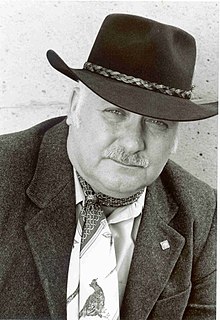A Quote by Ralph Sarchie
According to my religious belief, I'm sorry if you feel like I'm pushing this on you - my religious belief is that you behave the way God wants us to behave. And that's simply love God and love one another. If we did that, there would be no need for any of the other commandments. It would be great. But in the same vein, we would have obtained paradise by that point. And it's tougher to get to paradise by that point.
Related Quotes
Until the content of a belief is made clear, the appeal to accept the belief on faith is beside the point, for one would not know what one has accepted. The request for the meaning of a religious belief is logically prior to the question of accepting that belief on faith or to the question of whether that belief constitutes knowledge.
Earthly love… is temporal and slight so that is has to be given again and again in order for us to feel any sense of security; but God’s love, God’s voice and presence, would instill our souls with such affirmation we would need nothing more and would cause us to love other people so much we would be willing to die for them.
In the dominant Western religious system, the love of God is essentially the same as the belief in God, in God’s existence, God’s justice, God’s love. The love of God is essentially a thought experience. In the Eastern religions and in mysticism, the love of God is an intense feeling experience of oneness, inseparably linked with the expression of this love in every act of living.
No matter how much we may study, it is not possible to come to know God unless we live according to His commandments, for God is not know by science, but by the Holy Spirit. Many philosophers and learned men came to the belief that God exists, but they did not know God. It is one thing to belief that God exists and another to know Him. If someone has come to know God by the Holy Spirit, his soul will burn with love for God day and night, and his soul cannot be bound to any earthly thing.
The ghostly presence of virtual particles defies rational common sense and is nonintuitive for those unacquainted with physics. Religious belief in God, and Christian belief that God became Man around two thousand years ago, may seem strange to common-sense thinking. But when the most elementary physical things behave in this way, we should be prepared to accept that the deepest aspects of our existence go beyond our common-sense intuitions.
By the age of fifteen, I had convinced myself that nobody could give a reasonable explanation of what he meant by the word 'God' and that it was therefore as meaningless to assert a belief as to assert a disbelief in God. Though this, in a general way, has remained my position ever since, I have always avoided unnecessarily to offend other people holding religious belief by displaying my lack of such belief, or even stating my lack of belief, if I was not challenged.
When those deserving of Paradise would enter Paradise, the Blessed and the Exalted would ask: Do you wish Me to give you anything more? They would say: Hast Thou not brightened our faces? Hast Thou not made us enter Paradise and saved us from Fire? He would lift the veil, and of things given to them nothing would be dearer to them than the sight of their Lord, the Mighty and the Glorious.
And there is something profoundly humbling about knowing God. I’m not talking about the trinket God or the genie-in-a-lamp God. I mean the God who invented the tree in my front yard, the beauty of my sweetheart, the taste of a blueberry, the violence of a river at flood. There are a lot of religious trends that would have us controlling God, telling us that if we do this that and the other, God will jump through our hoops like a monkey. But this other God, this real God, is awesome and strong, all-encompassing and passionate, and for reasons I will never understand, he wants to father us.
Religion becomes a matter of belief, and belief acts as a limitation on the mind; and the mind then is never free. But it is only in freedom that you can find out what is true, what is God, not through any belief; because your belief projects what you think God ought to be, what you think ought to be true. If you believe God is love, God is good, God is this or that, your very belief prevents you from understanding what is God, what is true.
How would you feel if you had no fear? Feel like that. How would you behave toward other people if you realized their powerlessness to hurt you? Behave like that. How would your react to so-called misfortune if you saw its inability to bother you? React like that. How would you think toward yourself if you knew you were really all right? Think like that.
Do we behave out of fear of punishment, or out of the demands of our heart? For me, it is the latter, as I would hope is true for all adults, thought I know from bitter experience that such is not often the case. To act in a manner designed to catapult you into heaven would seem transparent to a god, any god,for if ones heart is not in allignment with the creator of that heaven, then... what is the point?
The Chief Justice's ... main point seemed to be that the references to God in the Pledge of Allegiance aren't really religious and therefore are not that important - something I would think would offend Christians who think it should stay because it is religious and does matter. Too many Christians appear to be desperate to shore up their failing confidence in their own religious beliefs by having the government officially endorse those beliefs.
It is a fool only, and not the philosopher, nor even the prudent man, that will live as if there were no God... Were a man impressed as fully and strongly as he ought to be with the belief of a God, his moral life would be regulated by the force of belief; he would stand in awe of God and of himself, and would not do the thing that could not be concealed from either.































